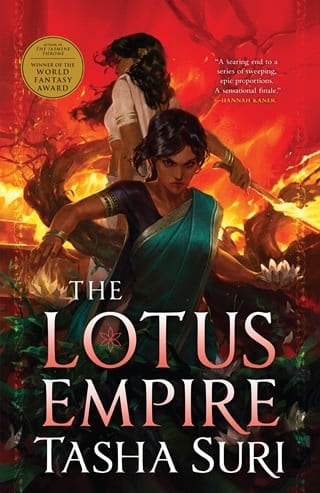Chapter 22 Malini
MALINI
All through the night she sat waiting for news. Oil lamps guttered and died, and new ones were lit. Swati yawned discreetly, leaning against the wall when she thought no eyes were on her. Deepa drooped in her seat, head propped up on one arm, eyes barely open—though she jumped upright whenever the doors opened and a new tray of tea was brought in and arrayed on the table.
Only Lata remained as awake as Malini.
It did not seem appropriate to play games of dice or chance when a woman could live or die, and a child along with her. Lata offered to play a singing game—“They don’t all have to be filthy songs,” Lata said, when Malini raised an eyebrow. “We could sing songs for good fortune. Healthy children.”
“But you’re so good at singing filthy songs,” Malini replied with a smile.
“If dice games aren’t appropriate—”
“—then dirty songs won’t be either, I know.” Malini sighed. “I’m afraid I don’t know any songs for good fortune.”
“Sahar would teach you if you asked.”
“I don’t think so,” said Malini. “She’s learned far too much about proper behavior for a guard since she left Raziya’s service. A pity.”
“Give her the chance to be bored, my lady, and I’m sure she’ll be ready for mischief again.”
They lapsed into silence. Malini could hear nothing but the quiet spit and smolder of the lanterns, the soft wheeze of Deepa’s breath as her head tilted forward, almost a snore.
“Shall I wake her?” Lata asked.
“No. Let her sleep.” She looked from Deepa to Swati to Lata. “I should let you all go to bed. It may be a long while yet.”
Lata hesitated, then said, “I could go. Into the birthing chamber.”
“I have eyes and ears and enough in there. No.”
“You could have been with her, my lady,” Lata said quietly.
“She will suffer enough in her life,” Malini said, equally quiet and thoughtful. “I don’t need to see her at her most vulnerable. It seems a cruelty too far.”
There was a thud of footsteps from the hallway. Sahar opened the doors and stepped inside.
“Empress,” she said. There was a hint of a smile at her mouth, despite the tired shadows under her eyes. “The baby’s born safely.”
“And Lady Varsha?” Malini asked.
“Healthy,” said Sahar. “If you want to speak to the physician, Empress…”
“Later.” Malini stood. “The baby,” she prompted.
“A son,” Sahar said, understanding the question implied in Malini’s voice.
A son. A prince.
She didn’t know if she felt relief.
An heir was a future—and a tool that would allow her to avoid marriage and childbirth. A son would be more readily accepted as her heir by the court than a daughter. There was some benefit in that.
But he was also a tool that could be used against her. He was a promise that even if Malini died, her family line—and the promises bound to it, that stitched the empire together—would outlive her.
He was all the more reason to let Malini burn.
Her instincts warred in her.
“I wish to see him,” she said.
The birthing room was bustling. Maids swept in and out. A physician stood by the bed. The attendants bowed when Malini entered.
Varsha watched Malini from the bed. Her skin had a grayish pallor. Her hair was lank. Her eyes were dull, but she gripped the squirming bundle in her arms as if those blankets of silk and cotton held the world inside them. Malini could only see one small hand—wrinkled, shockingly small, spasmodically grasping at nothing.
“A boy, Empress,” the physician said proudly, not waiting for Varsha to speak. “A healthy prince.”
Was she meant to value a prince more than a princess?
Malini took a step closer. Now she saw a little more. Black hair. A scrunched face. He appeared to be sleeping. He did not look like her brother, or like Varsha, or in fact like anyone. He was too new to the world to carry echoes and debts, perhaps.
“Congratulations, sister,” Malini murmured, meeting Varsha’s eyes. “I wish you a swift recovery, and health for your son.”
“Will there be celebrations, Empress?” Varsha’s voice was a thin and wavering reed.
There were always celebrations on the birth of an imperial scion. Sweets and coin handed out across the city. And gifts carved for the infant: beaded bracelets to ward off evil, bangles of silver to commemorate the shape of small wrists, a feather to be placed in the child’s swinging cot for sweet dreams. Varsha knew that. She was asking, in her own way, if her son would be acknowledged.
“He is a royal prince,” Malini said. “An imperial prince of Parijat. All the correct rites will be held. Prayers will be made, and offerings. Of course I will do everything I must, and everything I should.”
The baby made a hiccupping noise.
When Malini leaned closer, Varsha flinched. Her eyes closed. All her defenses had been ripped away, and the look on her face was a raw thing, weary and frightened and horribly resigned.
A hush fell over the room.
Malini did not say I will not take your child from you , even though the words rose unbidden in her throat. It should have horrified her that they all expected it, and yet—it did not.
It would have been the sensible thing to do. To take the only heir and make him her own; to mold him in her image, to make him love her, to place him beyond his mother’s power. She was clear-eyed and coldhearted enough to know that it would be a wise path.
But she wanted to make something better than Chandra had. She did not want to simply enact his old cruelties.
Malini touched her fingertips lightly to the baby’s forehead.
“He is beautiful,” she said softly. “Your son. He looks like you, Varsha. And a little like my emperor father.”
Lies, but they eased the tension from Varsha’s face.
“Give him a strong name,” Malini said, shaping her mouth into a smile. “Raise him well. But for now, sister—rest. I’ll ensure that all the proper rites are performed.”
 Fullepub
Fullepub 



